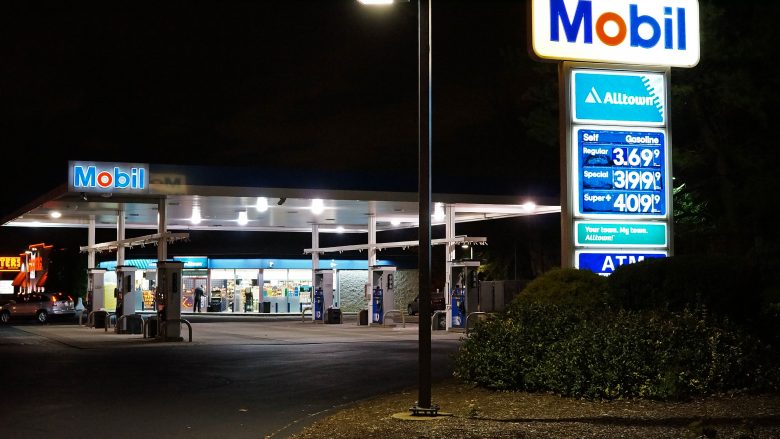NH moves a step closer to claiming $236M from Exxon
By Associated Press | May 20, 2016, 19:50 EDT
 A Mobil station seen during a time of higher gas prices. (Photo courtesy of Wikipedia.org)
A Mobil station seen during a time of higher gas prices. (Photo courtesy of Wikipedia.org) CONCORD, N.H. (AP) – New Hampshire is a big step closer to getting a $236 million judgment after the U.S. Supreme Court said this week it wouldn’t hear Exxon Mobil’s appeal regarding its use of a gasoline additive that contaminated groundwater in the state.
The case involved MTBE, or methyl tertiary butyl ether, a petroleum-based gasoline additive that has been used since the 1970s to reduce smog-causing emissions. The trial resulted in the largest jury award in the state’s history, and the state and Exxon could agree on the exact amount, which will include interest, as early as June.
New Hampshire sued Exxon and other oil companies in 2003 for damages to remediate MTBE contamination, saying Exxon knew it was supplying a product that is more difficult to clean up than other contaminants.
The Irving, Texas-based corporation said it used MTBE to meet federal Clean Air Act mandates to reduce air pollution and shouldn’t be held liable for sites contaminated by unnamed parties, such as owners of junk yards and independent gas stations
Other companies settled with the state, but the verdict against Exxon in 2013 came after a decade of litigation spanning five attorneys general and four governors.
Todd Spitler, a spokesman for Exxon, said Friday the company has worked with the state to remediate all gasoline spills that it is responsible for. Otherwise, he said, there is no “MTBE crisis” in New Hampshire and the contamination occurred “because someone spilled gasoline, not because it was added to gasoline produced in a refinery in another state.”
The federal Environmental Protection Agency says there’s insufficient evidence to estimate potential health risks of MTBE at low exposure levels in drinking water, but enough to conclude that MTBE is a potential human carcinogen at high doses.
In other MTBE cases, a judge last year approved a settlement between Exxon Mobil and New Jersey for $225 million over pollution around refineries in Linden and Bayonne, and at service station sites across the state. But environmental groups disputed the amount and have appealed it.
In 2014, the U.S. Supreme Court decided not to overturn a $105 million verdict against Exxon for contaminating groundwater in New York City. Pennsylvania and Vermont also filed lawsuits against oil companies that year, saying MTBE caused widespread groundwater pollution.
Here’s a look at MTBE cleanup in New Hampshire and how the money would be used:
—
MTBE CLEANUP:
MTBE has been banned in New Hampshire since 2007, but it takes a long time to biodegrade and the state Department of Environmental Services is still actively cleaning sites contaminated by the chemical. Many of the contamination problems originated 20 to 30 years ago. There are about 650 known sites that have contamination above state standards. They were discovered during the removal of gasoline tank systems, water supply sampling and property transfers. The state has completed 13 large cleanup projects involving underground storage tanks, addressing over 10,000 tons of contaminated soil. It put in a water line extension to provide city water to 30 homes in Rochester, and has similar extensions in progress in Derry, Windham and Epsom. It’s in the process of starting up a new well for Dover, after MTBE and other contaminants were found in and near the city’s largest well.
—
AVAILABLE FUNDS:
The state has been paying for MTBE cleanup from three funds. One of them, for $81.6 million, was created solely for MTBE cleanup after other oil companies New Hampshire had sued reached settlements with the state. To date, about $9 million of that amount has been spent. Regarding the other funds, one has an annual budget for leaking underground storage tank cleanup of $10.5 million; the other has an annual budget of $825,000.
—-
NEW FUNDS:
The $236 million headed to New Hampshire also will include interest. That has yet to be calculated, but has been estimated at about $100 million. It’s possible an agreement on the amount could be reached by Exxon and the state as early as June. A big chunk of the final amount will go into a trust fund recently signed into law by Gov. Maggie Hassan to protect drinking water and groundwater. The state Department of Environmental Resources will administer the trust fund as it continues to investigate contaminated groundwater. Under the language of the law, cleanup projects aren’t necessarily limited to MTBE contamination.
—
ADVISORY COMMISSION:
The new law also creates an advisory commission that will consult with the Department of Environmental Resources on projects. Lawmakers and representatives of public health, residents, communities, and others will sit on the commission. The members haven’t been appointed yet.
Written by Kathy McCormack











